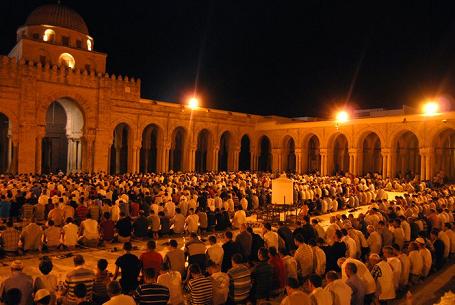by WorldTribune Staff, May 24, 2017
The Egyptian Ministry of Religious Endowments has banned mosques from using external loudspeakers during Taraweeh prayers.
Taraweeh is a special prayer recited only during the Muslim festival of Ramadan that is read following the fifth prayer of the day.

Religious Endowments Minister Mokhtar Gomaa said the rationale for the so-called “muezzin bill” is “noise prevention,” the Jerusalem Post reported on May 23.
According to Gomaa, “the ban on loudspeakers has been introduced in order to prevent disorder when all the voices of the imams become mixed up into each other, and so that the students will be able to concentrate on the readings.”
Apart from Taraweeh prayers, loudspeakers are mainly used to announce the call for prayer, the adhan, as well as the Friday prayer sermons.
Gomaa emphasized that “loudspeakers will be authorized when a mosque has insufficient capacity for all the prayer-goers, who will therefore need to pray outside.”
In response to the ban, the Dar al-Ifta, Egypt’s official religious institution tasked with drafting edicts, stated, “religious leaders have emphasized the need for loudspeakers so that those praying will be able to hear and follow the prayers. The call to prayer is also included in this law.”
The Egyptian parliament has also entered the debate, the Jerusalem Post report said. Members of the Egyptian Committee on Religion failed to reach consensus, with some describing the provision as important so that the loudspeakers will not be a nuisance, and others emphasizing the symbolic nature of the prayer during Ramadan.
In November 2016, the Israeli Knesset Ministerial Committee for Legislation authorized a loudspeakers bill which would force mosques to silence their loudspeakers. The bill must pass four readings in the Knesset before it can become law.
Egypt’s new provision has sparked anger at the same time that a Christian student was accepted to study Dentistry at the Islamic Al-Azhar University, the Post report said.
In addition, the report noted, a dispute has erupted after the Egyptian Ministry of Religious Endowments granted permission to a Coptic Christian journalist to renovate a mosque in his town – in what has been termed an “unprecedented move.”
